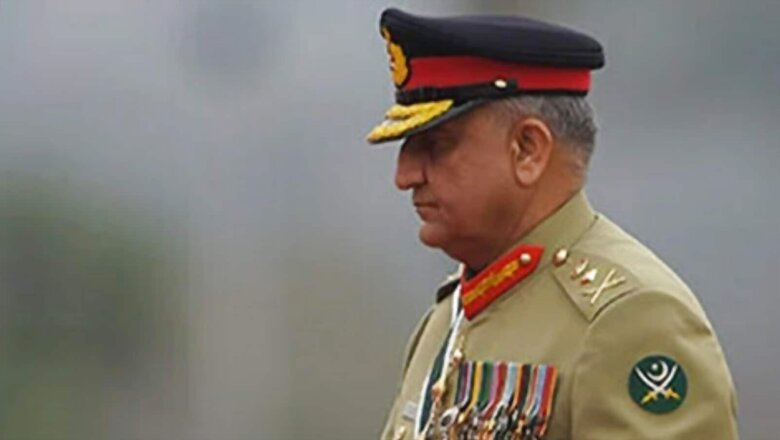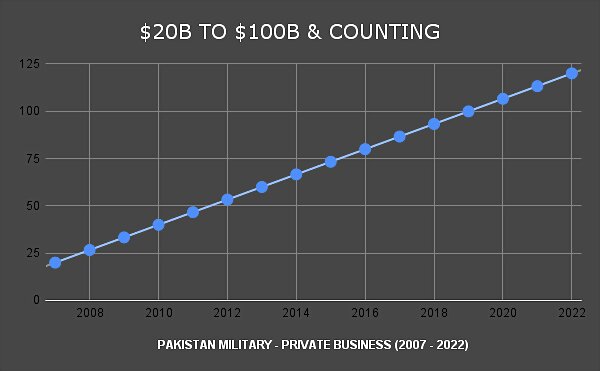
views
The story of the family wealth of Pakistan Army Chief General Qamar Javed Bajwa who is retiring on November 29 after a six-year term is an interesting anecdote that shows how the Pakistan army (PA), the most powerful institution in the country, is beyond audit, scrutiny, and answerability.
Pakistan has currently an external debt of $130 billion and is surviving on loans from other countries and multilateral financial institutions but PA is busy owning and looting the social and business interests of the nation that reflects in the unaccounted and disproportionate wealth and assets of senior rank military officers and their families.
According to an investigative report by Pakistan-based website ‘Fact Focus’ run by journalist Ahmad Noorani, the outgoing army chief and his family acquired assets and businesses of over 12.7 billion Pakistani rupees (PKR), or nearly $56 million, in just six years.
Bajwa’s wife was not a tax filer before he became PA chief in November 2016. She is now a billionaire.
His closest friend and future father-in-law of Bajwa’s son was just an ordinary businessman in Lahore owning a shop. He is now a billionaire.
His daughter-in-law, the daughter of his closest friend from Lahore, became a billionaire just nine days before her marriage.
The investigative report is based on income tax return documents of Bajwa and his family from 2013 and 2021. They show a rags-to-riches story for many family members, over six years, from November 2016 to November 2022. Bajwa and his immediate and extended families now own an oil company, many commercial plots, commercial plazas, huge farmhouses, and huge chunks of real estate land in Islamabad, Karachi, and Lahore, and have an international business with many foreign properties.
That is the “known” value of the Bajwa’s family business assets so far, the investigative report says. Ahmad Noorani could not get the tax returns of General Bajwa’s two sons. More interesting to note here is the fact that the mother and three sisters of Bajwa’s daughter-in-law, including a minor one, also turned billionaires in these six years.
The fortune of General Bajwa’s family, with many family members skyrocketing from zero assets to becoming billionaires in just six years, shows the hold and thus the ill-treatment that the PA extends to the nation. It extracts a heavy cost in the name of defending the country.
WHAT IS A COUNTRY’S MILITARY SUPPOSED TO DO?
Defending. That is the basic notion we derive when we think of the Indian military. True, they are extended civic facilities like housing and health welfare but that is available only till one serves in any of the wings of the armed forces. None of the armed forces are involved in any other business operation beyond defending the country.
Defending + everything else. That’s what the Pakistan military does. And out of the three services, the PA, Pakistan airforce, and Pakistan navy, the first one, being the most influential one, dominates this space.
A senior defence analyst from Pakistan, a senior fellow at King’s College, University of London, and a widely published author internationally, Ayesha Siddiqa, came out with her well-researched book, ‘Military Inc: Inside Pakistan’s Military Economy’ in April 2007. It was based on her work as a civil servant with the Pakistani government. She served in various positions dealing with military finance. She was the first woman and civilian who was appointed the director of naval research.
In an interaction with Al Jazeera in February 2008, she said her research estimated the Pakistan army’s private wealth could be as high as $20 billion: $10 billion in lands and $10 billion in private military assets. According to her research, a third of all heavy manufacturing and 7% of all private assets in Pakistan was under the control of the military. She calls military business “Milbus”, showing its journey from 1954 and how it evolved as Pakistan’s biggest conglomeration by the time her book was out.
Pakistan military runs many opaque foundations through serving and retired military officers. The tri-service Fauji Foundation is the largest of these, followed by the Pakistan army’s Army Welfare Trust (AWT), the Pakistan air force’s Shaheen Foundation, the Pakistan navy’s Bahria foundations, and the Defence Housing Authority (DHA). Together they run over 100 companies and are engaged in various business interests like banking, schools, universities, tourism, insurance, construction, IT, fertiliser plants, cement plants, oil business, shipping, harbour services, deep-sea fisheries, stud farms, restaurants, hosiery factories, milk dairies, petrol pumps, cereal production, and so on. Pakistan military business operations also include managing eight major housing societies in eight major cities of the country: Karachi, Lahore, Rawalpindi-Islamabad, Multan, Gujranwala, Bahawalpur, Peshawar, and Quetta.
Siddiqa’s numbers were dismissed but the country’s defence ministry informed the parliament on July 20, 2016, about the PA’s private business interests. The parliament was told that various wings of the country’s armed forces were running 50 commercial operations including housing colonies.
The core of a Milbus operation is mostly misusing the Pakistan military resources, says Ayesha Siddiqa’s book, like AWT’s tourism companies were using the PA resources to transport tourists or like another Milbus using military resources like equipment and personnel to construct the Karakoram Highway from between Pakistan and China. Many of these companies are not bothered even about the financial trouble they are in even if the outstanding loans run into billions of dollars as they easily get bailout packages from the civilian government.
12 years after Ayesha Siddiqa published her book in 2007, she said the turnover of the Milbus operations had crossed the $100 billion mark. She was quoted in an article published in the Asia Times on March 8, 2019. The article was about Pakistani military now venturing into the commercial oil business.
Siddiqa said the country’s military was underestimating its investment with running public sector organisations like National Logistics Cell, Special Communication Organization and Frontier Works Organization. These and other Milbus organisations were beyond government scrutiny and did not follow accountability measures put in place. Its prime example was the $370 million contract given to FWO to build a 470 km oil pipeline. The contract was earlier given to a civilian government-run entity Inter State Gas Systems (ISGS).
SMOOTH RIDE ON MILBUS
A $20 billion Milbus turnover became $100+ billion by 2019, or an average $6.66 billion growth every year.
A simple projection of it three years later means around $120 billion by the current year or 2022.

The five times growth in 12 years, from $20 billion in 2007 to $100 billion in 2019 means a compound annual growth rate (CAGR) of 14.35%. CAGR shows the average rate of return on investments over a year. 14.35% CAGR means Pakistan military is getting good returns from its business operations. And as alleged, misusing the Pakistan military resources for Milbus operations only adds more to the profit.
And the final Milbus turnover may even be more than this with allegations of the country’s military running many opaque organisations and public-sector undertakings to disguise its involvement.
BIGGEST BUSINESS ENTITY IN THE COUNTRY
Private business interests of the Pakistan military dwarf any other business group in the country by a very, very large margin.
According to the data obtained from Pakistan-based website https://www.economy.pk/, Nishat Group is the largest business conglomerate based in the country but its business worth, at $5.57 billion, is just a fraction of projected Milbus turnover of around $100 billion and counting.
According to the website, the cumulative fortune of Pakistan’s top 10 companies is just $25 billion.
BIGGEST LANDOWNER, BIGGEST LAND-GRABBER
Ayesha Siddiqa’s analysis said that Pakistan’s army owned around 12% of the total land of the country by 2007, when her book came out. Most of it was prime residential, commercial, and fertile farmlands in and around major cities and eastern Punjab province.
The land-reward system for military officers was started by General Muhammad Zia-ul-Haq. Zia-ul-Haq was a military dictator who seized power from a civilian government and ruled the country from 1978 to 1988 till his death in an aeroplane crash.
In an analytical January 2008 post, “The military millionaires who control Pakistan Inc”, published on the UK-based database website “The Spectator”, its author Elliot Wilson quoted Ayesha Siddiqa and said, “two thirds of the land was in the hands of senior current and former officials, mostly brigadiers, major-generals and generals and the most senior 100 military officials were estimated to be worth, at the very least, £3.5 billion.”
The Lahore high court in fact has called the PA the biggest land-grabber in the nation while hearing a land-grabbing case in April 2021. The court said the way the Pakistan army grabs people’s land, it seems it is ruling like a king, “The uniform of the army is for service and not to rule as a king.”
But they have ruled like kings only, setting in place a policy mechanism that makes every senior officer, from the rank of major and above, entitled to pieces of prime land donated at nominal rates. Their claim to the number of pieces of land increases as their rank increases. General Raheel Sharif, General Qamar Javed Bajwa’s predecessor who was Pakistan army chief from November 2013 to November 2016, was given 90 acres of prime agricultural farmland in Lahore after he retired. The expected cost of the land was 1.35 billion PKR or 49 crore Indian rupees (in today’s conversion rates) or $6 million (in today’s conversion rates).
While hearing a case on Pakistan’s military lands being used for commercial purposes, Chief Justice of Pakistan (CJP) Gulzar Ahmed, in November 2021, observed that the PA was there for the defence of the country and not for running business entities, but such violations by the institution had become common across the nation.
A Dawn report quoted him saying, “All the land of cantonments must be restored to its original condition. The Supreme Court will also review all of the army rules and laws in light of the Constitution. The army is there for the country’s defence, not for doing business.”
But there’s been no change so far. The army owned 12% of the country’s land by 2007. According to the International Institute for Strategic Studies (IISS), the Pakistan army has around 560,000 troops. The institution contains 10 official ranks, from the Second Lieutenant to the General who heads the PA. Many of them annually retire and become legally eligible for a prime piece or pieces of land as per the rank and so the current figure is expected to be much higher than the 12% estimate.
Read all the Latest News here


















Comments
0 comment